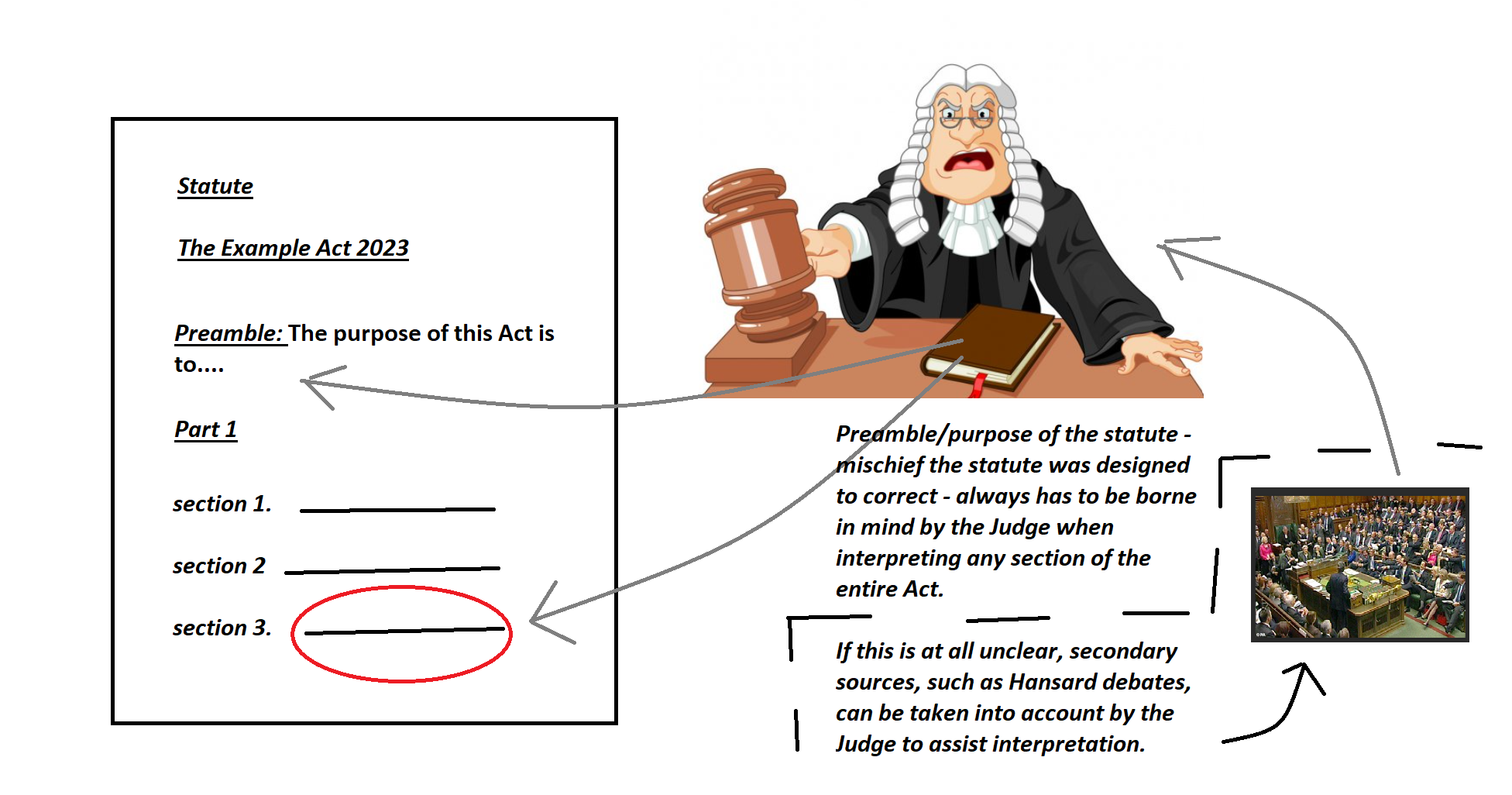Pepper v Hart, 1993 AC 593
Citation:Pepper v Hart, 1993 AC 593
Rule of thumb:What is the fundamental ways that statutes/Regulations are to be interpreted? This was a landmark case in UK law on statutory interpretation and it affirmed what is known as the ‘golden rule’ of statutory interpretation. If words in statutes are ‘clear & unambiguous’ and do not lead to a result which is an ‘absurdity’ then they should just simply be applied by the Courts, but, if there is ‘an absurdity’ or there is any sort of ‘ambiguity’, then all secondary sources of law such as Hansard debates etc can be interpreted by the Court before deciding on the meaning of the rules on legislation to decide whether they create liability in a certain scenario.
Background facts:
The facts were very simple – it involved a technical debate over whether debates from Parliament could used in arguments in Court.
Judgment:
The Court affirmed that the days of a strictly literal approach, where if a statutory provision made no clear literal sense then it could not be relied upon, no longer applied. It affirmed the modern day ‘golden rule’ of jurisprudence. Where the words are plain and unambiguous then they must be applied. However, if the meaning is not plain or unambiguous, or this can be shown to be absurd, meaning that they run contrary to mischief the Act was aimed to stop or violated human rights, then secondary sources of law such as Hansard & all other relevant secondary sources can be used to interpret the best, truest & fairest meaning of the provision in all the circumstances of the case.
The Court also affirmed the general principle that the Bill of Rights 1688 is still the bedrock constitution of human/constitutional rights in the UK. The Court further confirmed that traditionally in the UK, the right to freedom of speech, is considered the most important human/constitutional right of all because that is how other human rights abuses can actually be known about – freedom of speech is the facilitator of other human rights being respected so with the British Bill of Rights that is considered the most important right above all others.

Ratio-decidendi:
Article 9 of the Bill of Rights, “That the freedom of speech and debates or proceedings in Parliament ought not to be impeached or questioned in any Court or place out of Parliament” is of the highest constitutional importance… My Lords, I have come to the conclusion that, as a matter of law, there are sound reasons for making a limited modification to the existing rule [that Hansard may not be used] unless there are constitutional or practical reasons which outweigh them. In my judgment, subject to the questions of the privileges of the House of Commons, reference to Parliamentary material should be permitted as an aid to the construction of legislation which is ambiguous or obscure or the literal meaning of which leads to an absurdity. Even in such cases references in court to Parliamentary material should only be permitted where such material clearly discloses the mischief aimed at or the legislative intention lying behind the ambiguous or obscure words. In the case of statements made in Parliament, as at present advised I cannot foresee that any statement other than the statement of the Minister or other promoter of the Bill is likely to meet these criteria…. In prior cases, the fear had been expressed that using parliamentary debates as evidence in court could violate parliamentary privilege, under Article 9 of the Bill of Rights 1688 (since using parliamentary debates as evidence would involve discussing what went on in Parliament within the courts)… In my judgment, the plain meaning of article 9, viewed against the historical background in which it was enacted, was to ensure that Members of Parliament were not subjected to any penalty, civil or criminal for what they said and were able, contrary to the previous assertions of the Stuart monarchy, to discuss what they, as opposed to the monarch, chose to have discussed. Relaxation of the rule will not involve the courts in criticising what is said in Parliament. The purpose of looking at Hansard will not be to construe the words used by the Minister but to give effect to the words used so long as they are clear. Far from questioning the independence of Parliament and its debates, the courts would be giving effect to what is said and done there’, Lord Browne Wilkinson
Warning: This is not professional legal advice. This is not professional legal education advice. Please obtain professional guidance before embarking on any legal course of action. This is just an interpretation of a Judgment by persons of legal insight & varying levels of legal specialism, experience & expertise. Please read the Judgment yourself and form your own interpretation of it with professional assistance.

